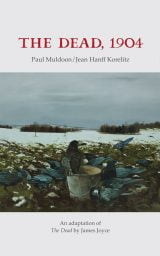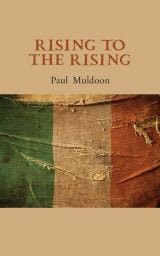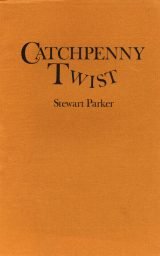‘Six Honest Serving Men was as effective a play as any Irish poet has written since MacNeice’s The Black Tower.’ — David Wheatley, The Irish Times
Although Paul Muldoon is best known as ‘one of the most inventive and ambitious poets writing today’ (Times Literary Supplement), he has also written Monkeys, a BBC television play about the entrapment of John Delorean, and Shining Brow, a libretto for Daron Aric Hagen’s opera about Frank Lloyd Wright, which was described by The London Review of Books as ‘displaying both an exemplary dramatic clarity and an endless aptitude for word-play and humorous equivocation’. Six Honest Serving Men, a verse play, centres on a safe house and a lookout post on the Irish border where six members of an IRA cell, along with the redoubtable Kate McInerney, are trying to make sense of recent developments.
‘Six Honest Serving Men was originally commissioned and produced by a theatre in Princeton, New Jersey. It consists of thirty-six short scenes, most comprising no more than twenty-odd lines of text, which shift between three different locations, all on the Armagh-Monaghan border. One is an IRA safe house, one an IRA look-out post, and the third, close to the look-out post, the home of the recently widowed Kate Mclnerney Aside from her, the other protagonists are six active IRA volunteers. The plot appears to centre on the identification of whichever of the six it was who informed upon and thereby caused the death of Kate’s husband, ‘Chief of their unit’. That is what it appears to be about. What it is actually about, in so far as Muldoon’s elusive and allusive text dares the reader, listener or viewer to reach any firm conclusion, is how the innumerable strands which have shaped the situation in which these characters have been placed render the passing of any absolute judgement a fatuous exercise. The play is not concerned with character development, and such action as there are borders (like the border) on the surreal so, not surprisingly with Muldoon, the main action lies in the play of its language . . . I don’t know if Six Honest Serving Men is great theatre, but it is a demanding, reflection-inducing read.’ — Oonagh Warke, Books Ireland
Six Honest Serving Men was originally commissioned and produced by a theatre in Princeton, New Jersey. It consists of thirty-six short scenes, most comprising no more than twenty-odd lines of text, which shift between three different locations, all on the Armagh-Monaghan border. One is an IRA safe house, one an IRA look-out post, and the third, close to the look-out post, the home of the recently widowed Kate Mclnerney Aside from her, the other protagonists are six active IRA volunteers. The plot appears to centre on the identification of whichever of the six it was who informed upon and thereby caused the death of Kate’s husband, ‘Chief of their unit’. That is what it appears to be about. What it is actually about, in so far as Muldoon’s elusive and allusive text dares the reader, listener or viewer to reach any firm conclusion, is how the innumerable strands which have shaped the situation in which these characters have been placed render the passing of any absolute judgement a fatuous exercise. The play is not concerned with character development, and such action as there is borders (like the border) on the surreal so, not surprisingly with Muldoon, the main action lies in the play of its language.
It is difficult not to wonder, then, about what the American audience before whom the play was first produced made of a text so firmly rooted in precise local knowledge. Was there a glossary included in the programme to explain Moy Park chicken, the Yeatsian subversions, Castlereagh, the UVF and all the nods and winks to the clichés of Ulster’s sordid little history? I said earlier that the text was elusive and allusive. That is not entirely true, to the extent that a large proportion of the dialogue allocated to Kate involves her reading extracts from American in-flight magazines, brought back to her by one Taco’ Bell (since disappeared, possibly, probably, possibly now dead, for some possibly, probably, possibly hinted-at unspecified betrayal by possibly, probably . . . etc.). These extracts, generally advertisements for high-tech gadgetry, are written in explicit, detailed, factual language, conveying the extent to which the gadgets can measure, quantify, calculate, programme and chart well-nigh anything. In other words, what you see (or read about) is what you get, the only problem being that the more such gadgets produce such calculations, the less, by implication, can they help to explain what is happening in the world around them. On a different level, either the language used by Kate and the volunteers is less exact and therefore more revealing, or else the more exact it is the less it allows itself to be taken at face value. Thus, the more (apparently) obvious debates within the play — old Hotspur and Victor derring-do values versus those of ‘hit and run’; Parnell versus the new IRA; Yeats versus the younger poets — are themselves undercut by the dialogue’s ongoing subversiveness. Kathleen, for example, repeatedly plays ‘I’ll take you home again, Kathleen’ to frustrate the (British?) army’s high-tech listening gadgetry, and this ploughs up yet more deception and corruption when it is revealed that what makes the fields so fresh and green is young men’s corpses.
The painting on the cover shows a blindfolded, emaciated young man, who may or may not be one of the six honest serving men himself or who, maybe, is the traitor amongst them. Depending upon which side of the fence you are on, the six honest serving men may not be the IRA volunteers at all but six members of the RUC or of a British army regiment. They may be, after all, simply the six characters from the rhyme, What and Why and When and How and Where and Who. The young man’s emaciation may or may not deliberately echo the H-block hunger strikers, who may or may not be heroes. Kate may or may not be a latter-day Caitlín Ní Houlihan. What does appear to be undeniable is that at the end of the play a man is about to be tortured with a Black & Decker drill. So perhaps what Muldoon wants us to do is to stop accepting and creating the myths that justify the view of history which enables us to justify the cruelties we tolerate in whatever name (do the UVF ‘like to chop off dicks’? Is the ‘Chief of today Farnell’s true inheritor?). I don’t know if Six Honest Serving Men is great theatre, but it is a demanding, reflection-inducing read. — Oonagh Warke, Books Ireland




